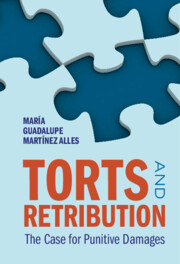Book contents
- Torts and Retribution
- Torts and Retribution
- Copyright page
- Dedication
- Epigraph
- Contents
- Preface
- Acknowledgments
- Introduction
- Part I The Place of Punishment in Torts
- Part II The Retributive Rationale
- Part III Retribution in the Mass-Market Setting
- 6 Understanding the Collective Context of Wrongdoing
- 7 Punitive Damages as Retributive Sanctions for Violations of Societal Trust
- 8 Product Liability, Risk Regulation, and New Technologies
- Part IV Why Tort Law
- Bibliography
- Index
6 - Understanding the Collective Context of Wrongdoing
from Part III - Retribution in the Mass-Market Setting
Published online by Cambridge University Press: 09 August 2025
- Torts and Retribution
- Torts and Retribution
- Copyright page
- Dedication
- Epigraph
- Contents
- Preface
- Acknowledgments
- Introduction
- Part I The Place of Punishment in Torts
- Part II The Retributive Rationale
- Part III Retribution in the Mass-Market Setting
- 6 Understanding the Collective Context of Wrongdoing
- 7 Punitive Damages as Retributive Sanctions for Violations of Societal Trust
- 8 Product Liability, Risk Regulation, and New Technologies
- Part IV Why Tort Law
- Bibliography
- Index
Summary
This chapter distinguishes different manners through which individuals and collective entities engage in reprehensible behavior and, on that basis, identifies two general contexts of wrongdoing: (1) a one-on-one context involving tortious situations where one individual directs her conduct toward another specific individual and (2) a collective context, which refers to tortious situations arising from impersonal market transactions between consumers and corporations. Each context of wrongdoing provides a framework from which distinctive understandings of punitive damages can be explored, one where the retributive reaction seeks to address invasions of dignitary interests and another for cases in which the retributive reaction responds to violations of societal trust. Ultimately, the chapter argues that any informed conversation on the place of retribution in the mass-market context requires improved understandings of the relevant markers for reprehensible behavior in that context (particularly the problem of asymmetry of information between manufacturers and consumers) and the correlative retributive motivations of consumers elicited in those wrongful situations.
Keywords
Information
- Type
- Chapter
- Information
- Torts and RetributionThe Case for Punitive Damages, pp. 167 - 185Publisher: Cambridge University PressPrint publication year: 2025
Accessibility standard: WCAG 2.0 AA
Why this information is here
This section outlines the accessibility features of this content - including support for screen readers, full keyboard navigation and high-contrast display options. This may not be relevant for you.Accessibility Information
Content Navigation
Allows you to navigate directly to chapters, sections, or non‐text items through a linked table of contents, reducing the need for extensive scrolling.
Provides an interactive index, letting you go straight to where a term or subject appears in the text without manual searching.
Reading Order & Textual Equivalents
You will encounter all content (including footnotes, captions, etc.) in a clear, sequential flow, making it easier to follow with assistive tools like screen readers.
Structural and Technical Features
You gain clarity from ARIA (Accessible Rich Internet Applications) roles and attributes, as they help assistive technologies interpret how each part of the content functions.
